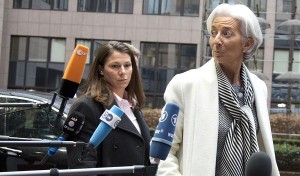Greece made a pitch Friday to convince its European creditors to accept its request for a six-month loan extension, which would allow Athens to pay its bills and avoid a potential exit from the euro.
The Greek government, effectively just a week away from having to fend for itself, is trying to convince its creditors in the 19-country eurozone that its request for an extension is sincere and not just a ruse — a “Trojan Horse”, according to one official in Germany — to buy time.
Its proposals have been met with an array of responses. While some countries have indicated that Thursday’s proposal was a helpful step in the right direction, others have been more negative.
In a major rebuff, Germany, perhaps the most influential creditor, said the proposals — which included commitments to meet debt obligations and sustain a degree of budgetary discipline — failed to go far enough.
Notably, it said they did not meet the commitments that previous Greek governments have undertaken. The Greek government, according to Berlin, must conclude the reforms, spending cuts, and tax increases demanded in exchange for the loans.
On Friday, German Chancellor Angela Merkel called for a “significant improvement in the substance” of Greece’s request for an extension to its loan arrangements.
Friday’s emergency eurogroup meeting, which will also include International Monetary Fund Managing Director Christine Lagarde and European Central Bank President Mario Draghi, is the third in just over a week. Financial markets have been gripped by the to-ing and fro-ing. On Friday, it seemed investors didn’t know which way to turn, with stock markets across Europe, including Athens, trading more or less flat.
“There is still reason for some optimism,” Jeroen Dijsselbloem, the head of the eurogroup said. “But it’s very difficult, as you well understand.”
Time is pressing as Greece’s European bailout program is due to expire after Feb. 28. Greece still needs help after that date to meet its financial obligations over the coming months. Without any further support, it faces defaulting on its debts and an exit from the euro, a scenario that would likely devastate the Greek economy at least in the short-term and generate renewed uncertainty for the global economy.
Friday’s meeting was called to respond to the left-wing Greek government’s demand for more time to finalize its current bailout program and negotiate new arrangements with its partners that will be less onerous on Greek citizens.
Arriving at the talks, Greek Finance Minister Yanis Varoufakis expressed hope for an agreement and urged eurozone members to do their part.
“The Greek government has gone the extra mile, the extra ten miles, and now we are expecting our partners to meet us,” he told reporters.
Greek Prime Minister Alexis Tsipras swept to power last month on a pledge to ease the budget belt-tightening and reorganize the 240 billion euro ($272 billion) bailout debt.
This report compiled information from Associated Press.
 CGTN America
CGTN America Managing Director of the International Monetary Fund Christine Lagarde, right, arrives for a meeting of eurogroup finance ministers in Brussels on Friday, Feb. 20, 2015. Eurozone finance ministers meet for a crucial day of talks Friday to see whether a Greek debt relief proposal is acceptable to Germany and other nations using the common currency. (AP Photo/Virginia Mayo)
Managing Director of the International Monetary Fund Christine Lagarde, right, arrives for a meeting of eurogroup finance ministers in Brussels on Friday, Feb. 20, 2015. Eurozone finance ministers meet for a crucial day of talks Friday to see whether a Greek debt relief proposal is acceptable to Germany and other nations using the common currency. (AP Photo/Virginia Mayo)
